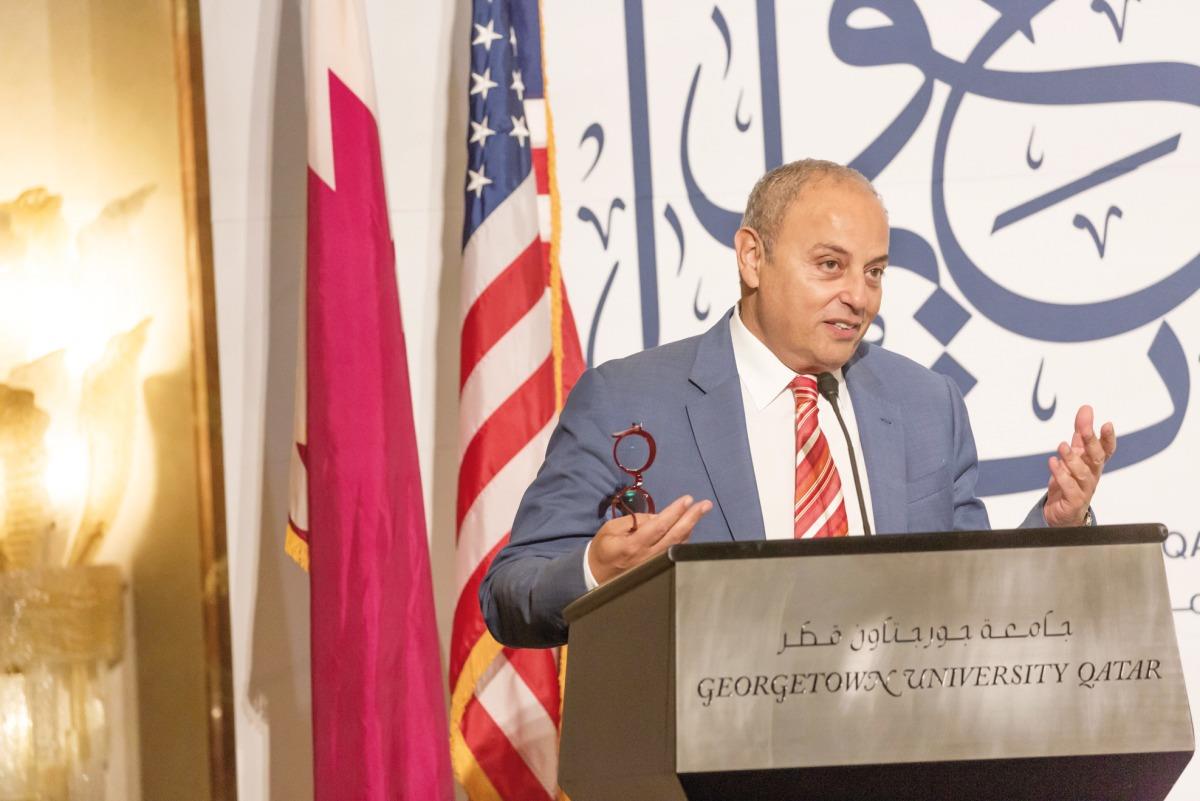
GU-Q Conference Lists Regional Solutions, Concerns Ahead Of COP28
Doha, Qatar: Outcomes from Georgetown University in Qatar (GU-Q)'s“Sustaining the Oasis” Hiwaraat conference are poised to be a catalyst for shaping new dialogues, collaboration, and research partnerships around water security and climate change, both within the region and around the globe.
Held on November 12-13, the conference was a collaboration between GU-Q and the Earth Commons Institute at Georgetown University in Washington, DC. Connecting policy with science, and new technology with circular and nature-based solutions, discussions shed light on the role of water as a force to achieve greater regional cooperation and stability, while driving climate change adaptation and mitigation.
Panellists during a session at the conference.
“One of the greatest values of dialogues like Hiwaraat is to kickstart important agendas for the future, to bring together people who care about common issues,” said Dean of GU-Q, Dr. Safwan Masri in his closing remarks.
“This [conference] is just the beginning of a conversation between [our campuses] and how we build an environmental presence here, in an area that is just so critical,” noted Dr. Peter Marra, Dean of the Earth Commons Institute.
Qatar's water strategy was the focus of a high-level panel with the Ministry of Environment and Climate Change and representatives from Qatar Foundation's environmental research centers. The country's efforts to honour its international commitments have seen challenges evolve into opportunities for the region, speakers noted, making solutions and technologies more accessible and affordable.
Dr. Jenny Lawler, Senior Research Director, QEERI Water Center, highlighted the value of research collaboration to advance technologies that solve shared global challenges. The role of Gulf countries in defining a water-secure world was the focus of another panel. Speakers pointed to achievements driven by the region's high adaptability, investments in non-conventional water sources, and wastewater reuse.
And although open access to water in the region has helped to drive development in the Gulf region, more sustainable consumption is needed. According to Roula Majdalani, Senior Climate Change Advisor, International Center for Agricultural Research in the Dry Areas (ICARDA),“the agriculture sector is where you can achieve better demand management [as] more countries in the region oscillate towards food sovereignty.''
She then outlined promising water-wise solutions in agriculture, including circularity, technology, precision agriculture, and heat-tolerant crops.
Regional disparities arising from conflicts, tensions with neighbours, and weak internal governance were recurring issues. During a panel addressing the food-water nexus, speakers observed that global food disruptions and conflict have compelled countries to rethink the concept of food security. However, varied strategies have strained natural resources, particularly water.
Dr. Logan Cochrane, Associate Professor, Hamad Bin Khalifa University, outlined Qatar's strategy to establish a national food reserve, strategically increase domestic production, develop the domestic market, and diversify imports.
Bridging regional water needs and global climate goals, a high-level panel discussed actionable strategies to position water in the climate agenda at COP28.“As the negotiations become more and more complex, we focus on solutions,” said Henk Ovink, former Dutch Special Envoy for International Water Affairs.
“Water, with its interlinkages with food security, energy security, and biodiversity, will play a key role in showing that, if we want to change course in the context of climate change, water is the best driver,” he added.
“With COP28 just weeks away, [ours] is an incredibly timely dialogue and the high-level findings from this conference will be shared with the COP28 Presidency team in support of water-related efforts,” noted Dr. Raha Hakimdavar, Senior Advisor to the Dean of GU-Q and the Dean of the Earth Commons.
Foregrounding innovation, sessions emphasised the need to integrate data from satellites and other sources into policy development and considered ways to integrate nature-based solutions to regenerate and restore fragile ecosystems, as well as looking to traditional knowledge.
The conference concluded with an inspirational performance by students that highlighted the universal nature of water challenges and the importance of mobilizing youth voices in water governance.

Legal Disclaimer:
MENAFN provides the
information “as is” without warranty of any kind. We do not accept
any responsibility or liability for the accuracy, content, images,
videos, licenses, completeness, legality, or reliability of the information
contained in this article. If you have any complaints or copyright
issues related to this article, kindly contact the provider above.


















Comments
No comment